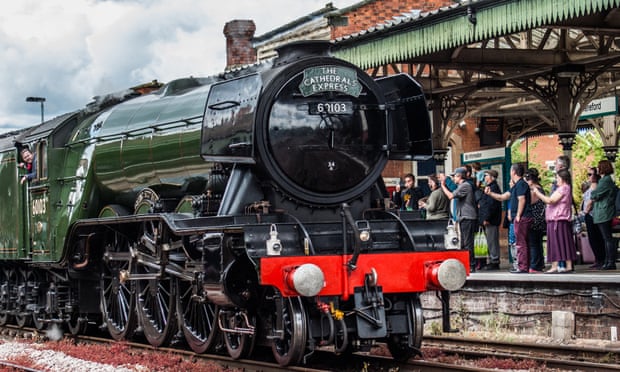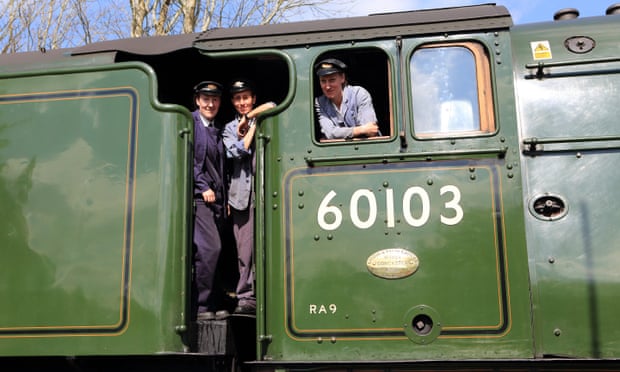Heritage railways and trains keep Britain's golden age of steam aliveSteam trains are expensive to operate but heritage railways are seeing a revival following the refurbishment of the Flying Scotsman Steam locomotive LNER» Class A3 4472, commonly known as the Flying Scotsman, at Hereford railway station. Photograph: Jim Wood/Barcroft Images
Steam locomotive LNER» Class A3 4472, commonly known as the Flying Scotsman, at Hereford railway station. Photograph: Jim Wood/Barcroft ImagesEight years before British Rail withdrew steam trains from regular service in 1968, the Bluebell railway opened as one of Britain’s first heritage lines, running between East Grinstead and Sheffield Park in Sussex. The popularity of steam trains has since led to many more such lines, dedicated museums and the reappearance of steam trains on what are now Network Rail’s tracks.
Perhaps the most famous steam locomotive, the Flying Scotsman, was retired by British Rail in 1963 – only to start a new career in heritage. Following a £4.2m refurbishment, its recent tour of Britain included a one-week visit to the Bluebell in April, where on its final day it was crewed by three sisters, Liz, Rebecca and Ruth Groome.
The Groomes, including their father Clive, are among 700 volunteers who keep the line going, with around 35% working regularly in jobs including ticket sellers, train drivers, guards, signal operators, restoration workers and the board of directors. It also has 63 paid staff.
Even with voluntary staff, the economics of steam are challenging. The railway brings in about £4m a year in ticket sales, retail and catering and private hire. For £650 you can spend a day as a train driver, and railway scenes for Downton Abbey were filmed at the Bluebell’s Horsted Keynes station. But this barely covers running costs, including £169,000 annually for coal. Capital expenditure is met by donations and grants from local councils, government and lottery funding.
 The Groome sisters volunteer to keep the Bluebell railway running. Photograph: Mike Hopps/Mikehopps.com
The Groome sisters volunteer to keep the Bluebell railway running. Photograph: Mike Hopps/Mikehopps.comIn some respects, steam trains are resilient and self-contained. As trains carry their own coal, used to boil water into steam with its expansion turned into motion, they do not need overhead lines or third rails like electric trains. Their weight also means they are more likely to cope with heavy leaf or snow falls.
However, the infrastructure to provide water and coal no longer exists on the main rail network, trains may not fit bridges or platforms and most are only allowed to run at 75mph on the main network, which blocks fast lines. Operating them from open cabs is a tough job, especially in winter – even if some people will pay to do it – and parts are no longer produced. This makes it vital that heritage railways attract younger volunteers, according to Bluebell railway communications director Roger Garman.
Garman adds that there are no operational benefits to steam trains. But he says: “In terms of passenger numbers and revenue, that’s a different stick. People will pay money, a premium, to ride behind an iconic steam locomotive.”
The Flying Scotsman could only get to Sussex thanks to the rejoining of the Bluebell line to the national network at East Grinstead in 2013. Previously, “it really was going from nowhere to nowhere,” Garman says, with most passengers driving along its route to its southern base at Sheffield Park. Now, visitors can catch a train from London to East Grinstead, take a steam train to Sheffield Park, visit the nearby National Trust gardens, and travel back in a day. Revenues rose from £3m to £4m for the year after East Grinstead’s opening.
Static steam trains can also benefit an area. The Steam museum of the Great Western Railway in Swindon attracts about 150,000 people each year to see eight
GWR▸ locomotives, including the Swindon-built King George V, rolling stock and exhibitions. It has a turnover of about £1.5m and aims to pay for itself as an attraction. It also serves as a conference centre, holding railway-themed events as well as beer festivals and film and TV event Comic Con.
The museum aims to represent Swindon’s culture of engineering and innovation, according to income-generation manager Ian Surtees. Swindon was a village of 2,000 people before the GWR built its workshops there and its employers now include Honda, BMW and high-tech companies, which took advantage of that engineering legacy.
Surtees says that journeys on the renovated Flying Scotsman are generating more interest in the golden age of steam: “People love that era. It smells great, it looks great.” While steam trains may have had their day in mass transportation, they can still bring benefits to places that celebrate their heritage.


